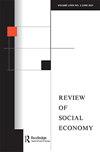俄罗斯无制裁
IF 1.6
Q2 ECONOMICS
引用次数: 6
摘要
本文表明,在成员共同承担负收入冲击风险的假设下,即使在没有社会规范和制裁制度的情况下,轮换储蓄和信贷协会也可以是可持续的。本文章由计算机程序翻译,如有差异,请以英文原文为准。
Roscas without sanctions
ABSTRACT This article shows that, under the assumption that members share the risk of negative income shocks, rotating savings and credit associations can be sustainable even with simple exponential discounting and without the presence of social norms and sanctioning systems.
求助全文
通过发布文献求助,成功后即可免费获取论文全文。
去求助
来源期刊

REVIEW OF SOCIAL ECONOMY
ECONOMICS-
CiteScore
2.60
自引率
10.00%
发文量
18
期刊介绍:
For over sixty-five years, the Review of Social Economy has published high-quality peer-reviewed work on the many relationships between social values and economics. The field of social economics discusses how the economy and social justice relate, and what this implies for economic theory and policy. Papers published range from conceptual work on aligning economic institutions and policies with given ethical principles, to theoretical representations of individual behaviour that allow for both self-interested and "pro-social" motives, and to original empirical work on persistent social issues such as poverty, inequality, and discrimination.
 求助内容:
求助内容: 应助结果提醒方式:
应助结果提醒方式:


